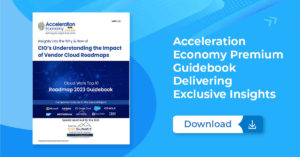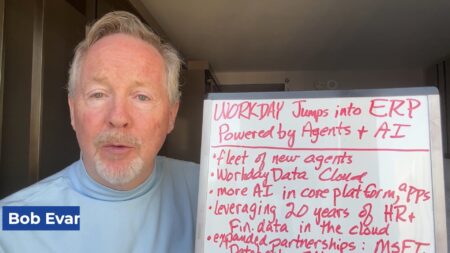
While undoubtedly, the electrification of vehicles and the continuing search for more carbon-friendly fuel substitutes are leading the conversation when discussing the future of the automobile sector, it’s not the only conversation. The future of motoring goes beyond the hardware that will propel the cars, trucks, and motorbikes of the future and includes essential discussions about safety, connectivity, comfort, and efficiency.
I recently shared that AWS has teamed up with BMW to provide the infrastructure required to support the car manufacturer’s ambitions of becoming a leader in the autonomous vehicle space. Now, an announcement from Salesforce indicates that another company in the Cloud Wars Top 10 could become a significant player in enabling the next generation of driving experiences.
Advancing the Automotive Cloud
Salesforce’s Automotive Cloud, a bespoke cloud designed to streamline insights and digital experiences for customers in the automotive industry, was launched in October 2022. General availability for many recently announced innovations is expected in early 2024, enabling users to leverage a unified data platform covering all critical touchpoints and encouraging a new era of vehicles defined by software. So, what can automakers expect, and what will the impact be?
Achyut Jajoo, senior vice president and general manager of automotive and manufacturing at Salesforce, said the following in a recent press release, “Automotive Cloud will provide a real-time digital view of a vehicle’s connected features, services, and telemetry data so automakers can combine it with everything they know about the driver to orchestrate personalized, connected car experiences.”
A Boost for Automakers and Fleet Owners
The enhancements to the Automotive Cloud will benefit both automakers and fleet owners. From the automaker side, Salesforce is introducing a Connected Vehicle Visualization component that enables automakers to receive real-time visualizations of in-vehicle-connected features and services. The aim is to support tailored in-car experiences and notify customers of any emerging services or upgrades in context.
With Actionable Telematics, automakers can monitor telematics data such as location, speed, fuel level, consumption, or battery health. With this data, customers can be alerted automatically when something in the vehicle is interpreted as unusual.
Automotive Cloud is powered by Salesforce Data Cloud, which drives the unification of real-time data from any source. At the same time, automakers can quickly use Einstein Studio to develop custom artificial intelligence (AI)models. Moving forward, a combination of the connected car data delivered through the new cloud enhancements and AI models will enable predictive analytics, providing companies with the real-time data they need to make suggestions, such as new vehicles a customer may want to purchase when the mileage clock reaches a specific number.
For fleet owners, the Fleet Management feature, generally available, enables customers to get a holistic view of their fleet so they can develop strategies based on driver behavior and act on any alerts, such as required maintenance.
For finance teams, Automotive Cloud for Captive Finance will enable users to see the entirety of a driver’s auto finance portfolio, while Automotive Loan and Lease Console will bring in automation and personalized customer updates to facilitate customer service provisions.
Why Invest in the Software-Driven Automotive Market?
These enhancements to Automotive Cloud represent a serious investment, as does AWS’s commitment to providing BMW with the means to conquer the autonomous vehicle market. So, why the push for innovation in this sector? Ultimately, the statistics speak for themselves.
According to one McKinsey study, 95% of all new vehicles sold by 2030 will be connected cars, an increase of 50% from 2021. The autonomous vehicle market is expected to create between $300 and $400 billion in revenue by 2035. Yet, without cloud providers, none of this connectivity, real-time data, and intelligence would be possible at scale. And, with such expansive opportunities to contribute to this growth, the future of the automotive industry could soon become the next battleground in the ongoing cloud wars.
Discover how AI has created a new ecosystem of partnerships with a fresh spirit of customer-centric cocreation and a renewed focus on reimagining what is possible. The Acceleration Economy AI Ecosystem Course is available on demand.










